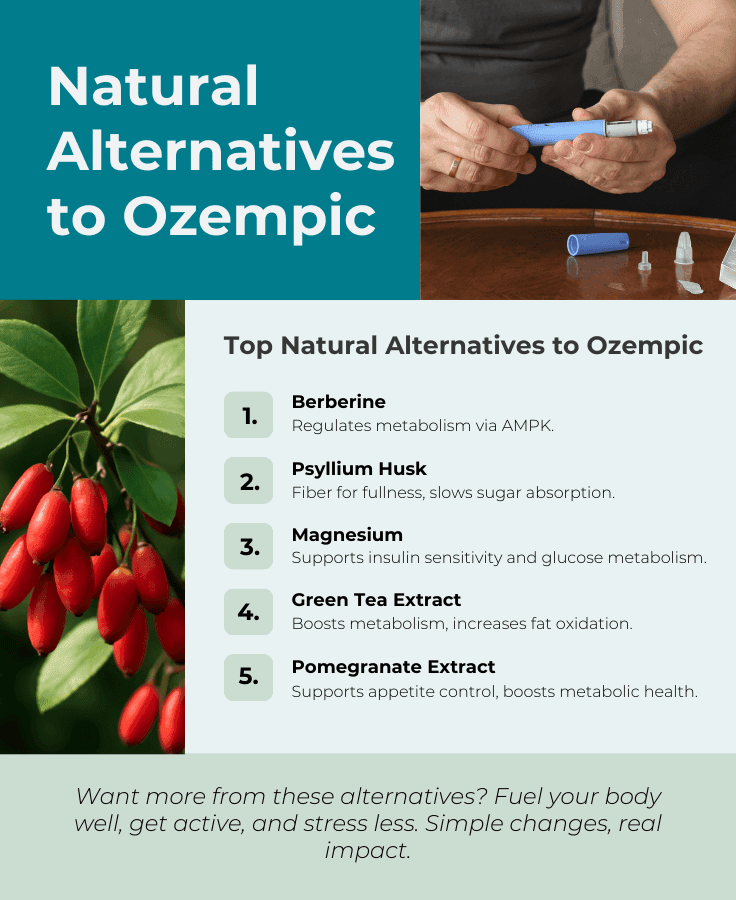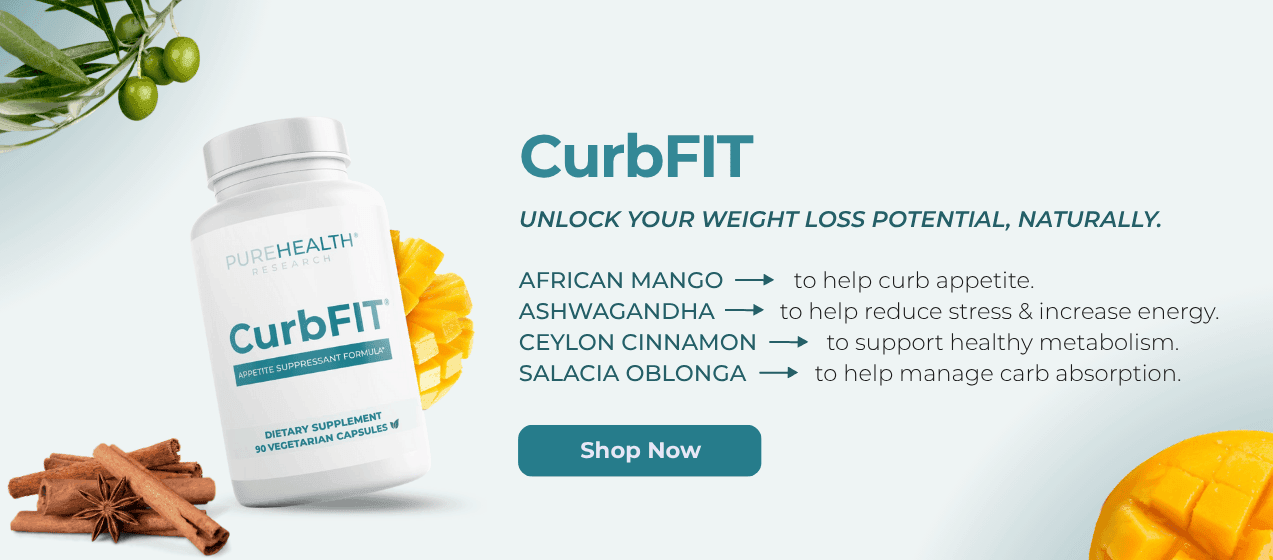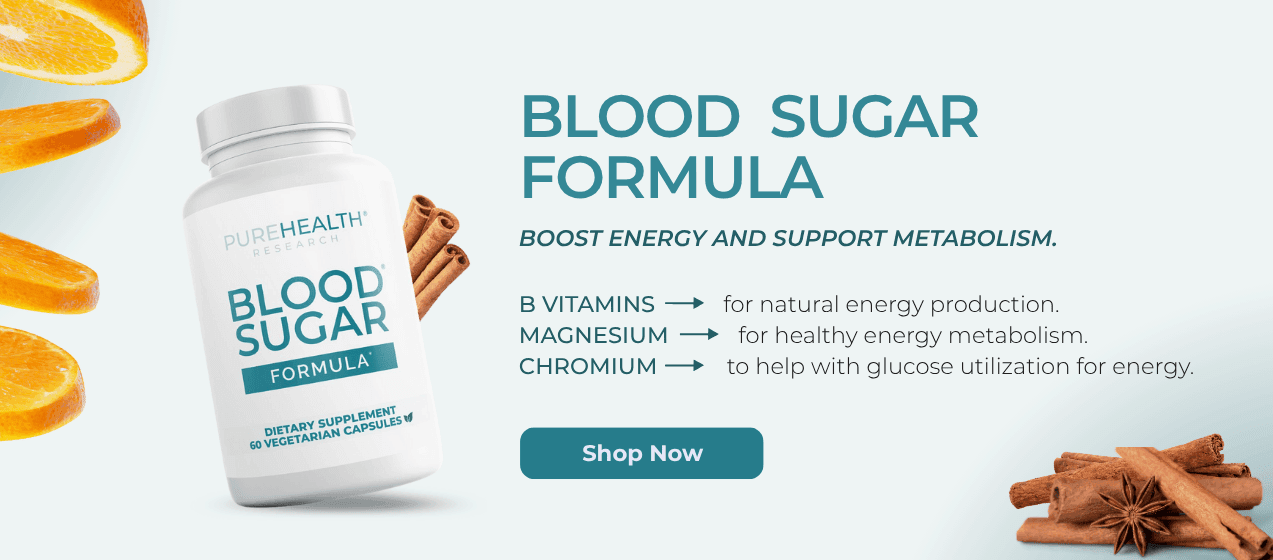What Are the Natural Alternatives To Ozempic?
What supplements work as a natural alternative to Ozempic? New research reveals promising options for metabolic health.


In a world where weight management solutions make headlines daily, Ozempic has become the medication everyone’s talking about. Its dramatic results have captured attention, but the high cost, limited availability, and potential side effects scared many people away.
While no natural supplement can perfectly mimic prescription medications, nature offers several intriguing possibilities for those seeking natural alternative to ozempic.
This article examines the science behind several natural alternatives to ozempic that research suggests may influence circulation, metabolism, and appetite regulation. We’ll explore what these options can realistically offer, who might benefit from them, and how they can be incorporated into a comprehensive approach to wellness.
What is Ozempic and Why Are People Seeking Alternatives?
Ozempic, containing semaglutide, is an FDA-approved prescription for Type 2 Diabetes and cardiovascular risk reduction. While impacting appetite and blood sugar, it’s not approved for weight loss. Alternatives are sought for reasons like cost, insurance, side effects, supply issues, or personal preferences.
Ozempic can cost over $900 per month without insurance, making it out of reach for many. The limited availability due to high demand has also created access problems.
Side effects pose another concern. Ozempic can cause nausea, vomiting, and digestive issues. In rare cases, it may lead to more serious conditions like pancreatitis or thyroid tumors. OZEMPIC CAN BE DANGEROUS for some people, especially those with certain medical conditions.
Many also prefer a natural health approach, seeking solutions that work with the body’s processes rather than introducing synthetic compounds. Looking to address body changes more holistically? Some people pair these alternatives with targeted approaches like exercises to lose face fat.
Best Supplements As a Natural Alternative To Ozempic
Several supplements have shown promise as natural options that may provide some of the benefits people seek from medications like Ozempic. People turn to these supplements as part of a natural approach to health, seeking what some call “nature’s ozempic” in plant-based compounds and fibers.
1. Berberine
Berberine, found in plants like barberry and Oregon grape, has gained attention for its effects on metabolism. This yellow compound may activate AMPK, an enzyme that helps regulate metabolism and energy use in cells. A study in 2019 found that berberine could help improve insulin resistance.
Another clinical study published in Metabolism showed that berberine produced significant decreases in hemoglobin A1C, fasting blood glucose, and postprandial blood glucose levels in patients with type 2 diabetes. Unlike Ozempic, berberine works through multiple pathways in the body to potentially support metabolic health.
2. Psyllium Husk
Psyllium husk fiber creates a gel-like substance in your digestive system that may slow food absorption and provide a feeling of fullness. A 2020 systematic review and meta-analysis found that psyllium supplementation significantly decreased fasting blood glucose levels and systolic blood pressure.
Clinical study showed that taking psyllium before breakfast and lunch led to significant feelings of fullness between meals compared to a placebo. This natural fiber supplement might help control appetite and stabilize blood sugar levels by slowing the absorption of sugar into the bloodstream. Taking psyllium before meals may help reduce overall food intake and support digestive health.
3. Magnesium
This essential mineral plays a role in over 300 enzyme reactions in the body, including those involved in blood sugar regulation. A clinical trial found that oral magnesium supplementation improved insulin sensitivity and metabolic control in type 2 diabetic subjects with decreased serum magnesium levels.
A review in Frontiers in Nutrition analyzed 24 randomized controlled trials and found that magnesium supplementation decreased fasting blood glucose levels. Magnesium deficiency is common and may affect insulin sensitivity. Supplementing with magnesium may support better glucose metabolism and energy production. It also contributes to healthy sleep patterns, which are important for weight management and metabolic health.
4. Green Tea Extract
Green tea extract contains compounds called catechins, particularly EGCG, along with a moderate amount of caffeine. A randomized, double-blind clinical trial found that 12 weeks of treatment with high-dose green tea extract resulted in significant weight loss and reduced waist circumference in women with central obesity.
Another study in the American Journal of Clinical Nutrition demonstrated that green tea extract stimulated thermogenesis and fat oxidation, potentially influencing body weight through changes in energy expenditure. These substances may temporarily increase metabolism and fat oxidation.
5. Pomegranate Extract
Pomegranate extract looks quite promising. It seems to naturally boost your body’s GLP-1. A 2022 study found it helped people feel less hungry. Participants in the study ate less food at their test meals.
Then, a 2023 study dug deeper. It showed pomegranate might improve things like weight and body fat. That’s especially true for people with certain liver conditions. Pomegranate also has cool compounds called polyphenols. They fight inflammation, which is great for your metabolism.

For those seeking a comprehensive approach to appetite management, CurbFit offers a blend of natural ingredients designed to help control food cravings. This supplement contains Fermented Nutritional Yeast Protein, green tea extract, and other plant-based compounds that work together to promote feelings of fullness and support healthy metabolism, making it easier to stick to your eating plan.
If you’re looking to support healthy metabolism as you age, check out these effective strategies to increase metabolism after 40.
Other Natural Habits to Support Weight Management
Beyond supplements, daily habits play a crucial role in managing weight and blood sugar levels. A holistic approach that includes dietary changes can provide sustainable results that may complement what medications offer.
Increase Protein Intake
Researchers found that higher protein intake leads to greater feelings of fullness and reduced subsequent calorie intake. Protein takes more energy to digest than other nutrients and helps preserve muscle mass during weight loss. Aim to include quality protein sources like fish, poultry, eggs, dairy, beans, and lentils with each meal. This approach helps maintain stable blood sugar levels and reduces hunger between meals.
Boost Fiber Consumption
A systematic review found that dietary fiber intake is strongly associated with weight loss and improved metabolic health markers. Foods like vegetables, berries, beans, and whole grains slow digestion, improve gut health, and create lasting fullness. Try adding an extra serving of vegetables to each meal or swapping refined grains for whole versions to increase your daily fiber intake naturally.
Practice Mindful Eating
Research shows that mindful eating interventions are effective for reducing weight and improving eating behaviors in adults. Pay attention to hunger and fullness cues rather than eating by the clock. Eat slowly, savoring each bite and putting your fork down between mouthfuls. This approach helps you recognize when you’re satisfied before you become uncomfortably full.
Incorporate Regular Exercise
A recent study concluded that exercise, even without weight loss, significantly improves cardiometabolic health. Even moderate exercise like daily walking improves insulin sensitivity and supports metabolic health. Adding strength training preserves muscle mass, which is essential for maintaining a healthy metabolism. For those with mobility limitations, somatic exercises for weight loss may provide gentle yet effective movement option.
Support Blood Sugar Balance with Natural Compounds
For individuals concerned about blood sugar stability, Blood Sugar Formula provides targeted nutritional support with ingredients like Berberine, Chromium, and Magnesium. These natural compounds may help maintain healthy glucose levels, making it easier to maintain energy levels throughout the day without the crashes that can trigger unhealthy eating.
If you’re also looking to support your weight management journey, click here to explore effective weight loss supplements that can complement your healthy lifestyle and help you reach your goals.
Pros and Cons of Natural Ozempic Alternatives
When considering natural ozempic alternatives, it’s important to weigh both benefits and limitations to set realistic expectations.
| Pros | Cons |
| Fewer side effects compared to prescription medications | Results typically develop more gradually than with medications |
| More affordable and accessible without a prescription | Effects may be more subtle and vary widely between individuals |
| Support overall health beyond just weight management | Require consistency and patience to see benefits |
| Can be used alongside other healthy lifestyle changes | Less research exists compared to prescription options |
| May address root causes rather than just symptoms | May not be potent enough for those with significant health issues |
| Sustainable for long-term use | Require more active participation and lifestyle changes |
The natural approach requires commitment but offers potential benefits beyond weight management, including improved energy, better digestion, and enhanced overall wellness. For many people, these comprehensive improvements make natural alternatives worth considering despite the slower timeline.
Final Thoughts
Natural alternatives to Ozempic offer promising options for those seeking to manage their weight and blood sugar through non-pharmaceutical means. While supplements like berberine, psyllium husk, and pomegranate extract may provide some similar benefits to prescription medications, they work best when combined with dietary changes and regular physical activity.
Ozempic can be dangerous for some people, but natural supplements may also cause adverse effects, especially when combined with certain medications. Always consult with a healthcare provider before starting any new supplement regimen, particularly if you take other medications or have existing health conditions.
The most successful approach is typically one that combines multiple strategies—nutritional supplements, mindful eating habits, regular physical activity, and adequate sleep. This comprehensive approach addresses the root causes of weight and metabolic issues rather than simply treating symptoms.
No single natural option works exactly like Ozempic, but berberine shows the most promise by activating similar metabolic pathways. A combination of supplements and lifestyle changes typically works better than any single natural alternative.
Green tea contains compounds that may support metabolism and fat oxidation. While not as potent as Ozempic, regular consumption of green tea or its extract might contribute to modest weight management benefits when combined with healthy habits.
The best alternative depends on individual needs. Berberine shows promising research for blood sugar management, while fiber supplements like psyllium help with fullness. A comprehensive approach combining supplements with diet and exercise typically yields the best results.
“Nature’s Ozempic” typically refers to berberine. Research shows it may help with blood sugar control and modest weight management, though effects are generally less dramatic than prescription medications. Results vary significantly between individuals and develop more gradually.
Sign up for our Healthy Living newsletter!
Advertisement. This site offers health, wellness, fitness and nutritional information and is designed for educational purposes only. You should not rely on this information as a substitute for, nor does it replace, professional medical advice, diagnosis, or treatment. If you have any concerns or questions about your health, you should always consult with a physician or other health-care professional. Do not disregard, avoid or delay obtaining medical or health related advice from your health-care professional because of something you may have read on this site. The use of any information provided on this site is solely at your own risk.












